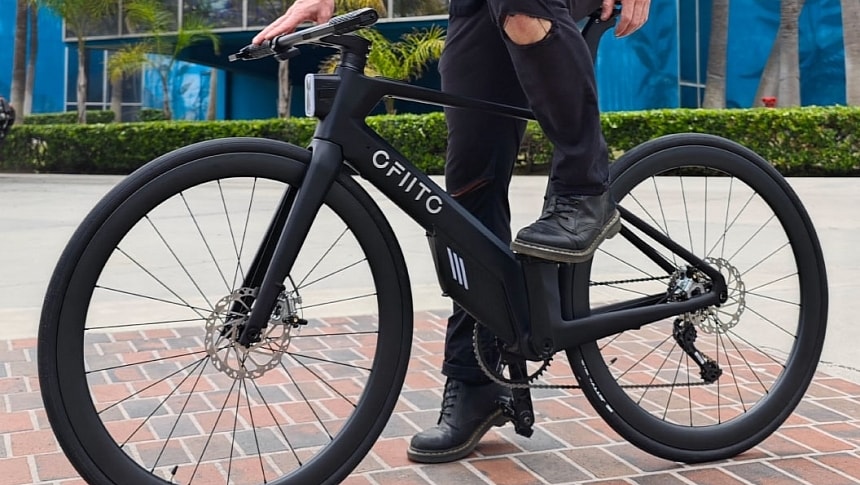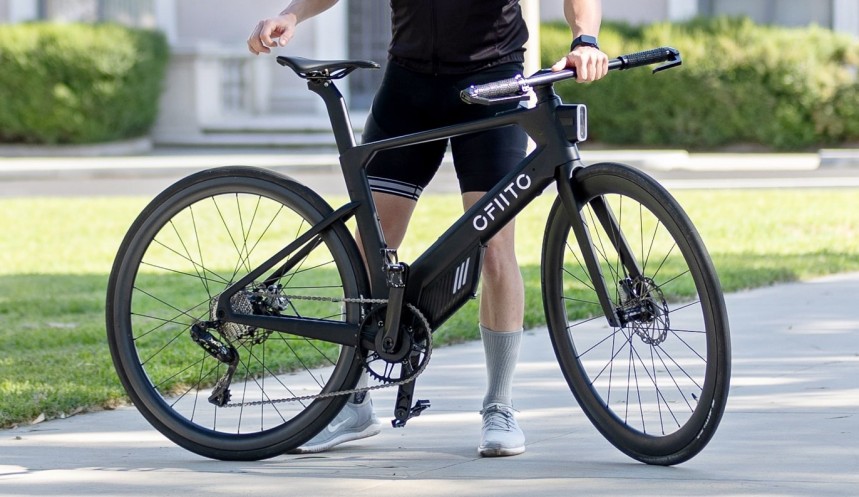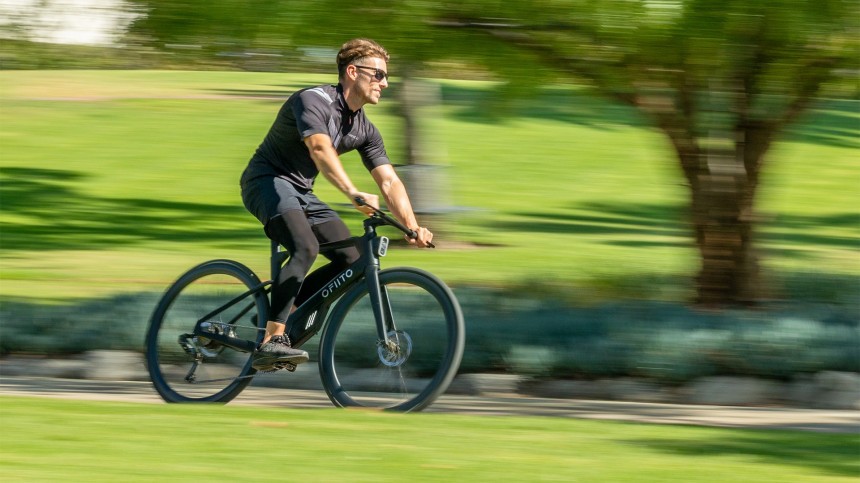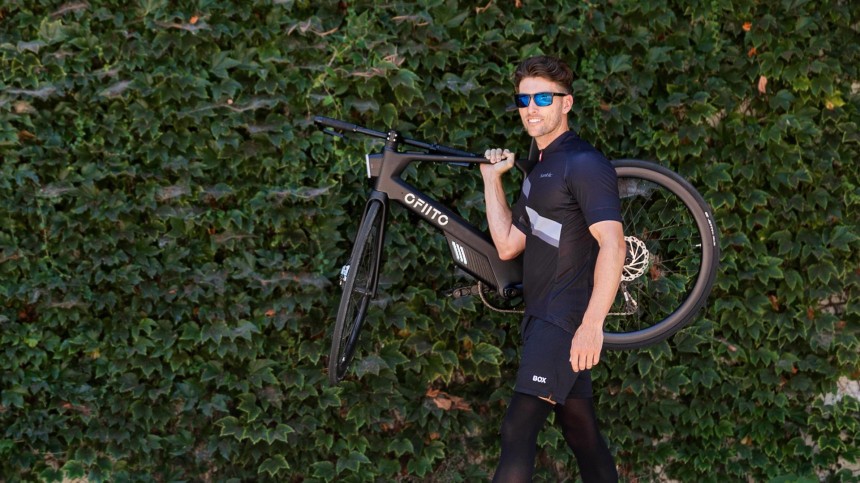It had to happen eventually; brands are now hitting the urban mobility industry with a carbon fiber machine meant to be the ultimate solution to traveling around town with good old green energy.
One such brand is Ofiito, and yes, as you might expect from the way that two-wheeler presents itself, this brand is Chinese. However, unlike other no-name brands, Ofiito has actually been in the works for some time now, and ever since its parent company, Shanghai Weixi Power Technology Co., started showing the R3, AKA Urban Racer, to the world, they've been scooping up award after award for what they've achieved. Heck, Shanghai Weixi Power even has a history of building products that have been bestowed with the prized iF Design Award.
As for the Urban Racer, it's won the Golden Pin Design Award, and today, we're going to explore precisely why that is. If you're in the market for an electrified two-wheeler that's about as light and affordable as the industry will allow, you'd better whip out your wallets for this one.
Now, carbon fiber 'anything' isn't cheap, and the R3 also follows this rule. If we consider that the frame, fork, handlebar, seat post, and even rims (optional) are from carbon fiber, we can understand why the R3 is said to retail at a solid $4,000; wait, there's still hope!
One of the benefits of catching news of something like the R3 before it's even launched - it's currently in the crowdfunding stages on Indiegogo and set to launch on March 28, 2024 - is the fact that you can get your hands on one for as little as $2,000 (€1,850 at current exchange rates), a benefit of being an early backer of the project. Now that's more like it!
To help you understand a bit about what Ofiito offers here, let's break down the bike and take a closer look at how it's built. As I mentioned, nearly everything on this bike is carbon fiber, and all that starts with T800 goodness.
According to Toray Composite Materials America, this stuff is "an intermediate modulus, high tensile strength fiber, with high level and balance composite properties. Designed and developed to meet the weight-saving demands of aircraft applications." Honestly, that alone has my interest.
With this composite material, Ofiito then brings the frame to life and bases it around an "Open Road Geometry," whatever that means. I mean, I can figure out what that means, but this isn't an actual category of bike frames; moving on. All that's then supported with internal cable routing and a removable and integrated down-tube battery. It's that bulk hanging off the underside of the bike, right above the BB (Bottom Bracket).
Moving forward with the whole carbon fiber goodness in store, we arrive at the front fork. It, too, is ready with internal cable routing and set for flat-mount disc brakes. As for the handlebar, it's yet another carbon fiber component, and since integration is key, it shares the same construction with the R3's stem. As mentioned, the seat post is also carbon fiber, and T800 makes up all that I've mentioned.
Now, as we move forward, the R3 starts to show off some rather interesting abilities. One feature that Ofiito has in store for future owners is the ability to choose if you want electric or manual power, and I'm not talking about just switching ride modes.
Interestingly enough, the R3 presents itself to the urban mobility game with a removable motor. Yet, I'm still trying to figure out just how all that happens because judging by the manufacturer's website, the motor is mounted with the wheel spokes, and removing it would mean stripping the entire rear wheel and putting it all back together again; a very time-consuming process that can be carried out with virtually any e-bike. Maybe I'm missing something.
But a motor is a motor, and the one on the R3 is a 250 W powerhouse with the ability to crank out just 30 Nm (22 lb-ft) of torque. Luckily, the R3 is designed to accommodate up to a 12-gear cassette, so it should be an interesting ride, to say the least.
Things do get a tad more interesting as we explore the rest of the drivetrain. The name L-Twoo is spotted in the spec list, and if you know what this brand is responsible for, you know that wireless shifting is at your fingertips on the R3. L-Twoo is yet another Chinese brand that's looking to offer a wireless shifting experience like SRAM and Shimano but at less than half the cost.
Throw on some carbon fiber rims (optional) and a pair of continental rubbers tuned to a slick 28 mm cross-section, and you'll be flying around town on an electrified two-wheeler that weighs just 13,8 kgs (30 lbs) for a size M. Not bad at all, Ofiito. As a little side note, I've covered just how cheap of an e-bike you can build with materials sourced from China, and to do all this on a T800 frame for just $2,000 is no easy feat.
But is it all we'll ever want from a carbon fiber e-bike made for day-to-day use? The answer to that question is dependent on so many factors that it's difficult to say yes or no. However, it's not often we run across an e-bike that's built entirely out of carbon fiber, sporting an electric shifting experience, and currently selling for just $2,000. Just a little something-something to consider.
As for the Urban Racer, it's won the Golden Pin Design Award, and today, we're going to explore precisely why that is. If you're in the market for an electrified two-wheeler that's about as light and affordable as the industry will allow, you'd better whip out your wallets for this one.
Now, carbon fiber 'anything' isn't cheap, and the R3 also follows this rule. If we consider that the frame, fork, handlebar, seat post, and even rims (optional) are from carbon fiber, we can understand why the R3 is said to retail at a solid $4,000; wait, there's still hope!
To help you understand a bit about what Ofiito offers here, let's break down the bike and take a closer look at how it's built. As I mentioned, nearly everything on this bike is carbon fiber, and all that starts with T800 goodness.
According to Toray Composite Materials America, this stuff is "an intermediate modulus, high tensile strength fiber, with high level and balance composite properties. Designed and developed to meet the weight-saving demands of aircraft applications." Honestly, that alone has my interest.
With this composite material, Ofiito then brings the frame to life and bases it around an "Open Road Geometry," whatever that means. I mean, I can figure out what that means, but this isn't an actual category of bike frames; moving on. All that's then supported with internal cable routing and a removable and integrated down-tube battery. It's that bulk hanging off the underside of the bike, right above the BB (Bottom Bracket).
Now, as we move forward, the R3 starts to show off some rather interesting abilities. One feature that Ofiito has in store for future owners is the ability to choose if you want electric or manual power, and I'm not talking about just switching ride modes.
Interestingly enough, the R3 presents itself to the urban mobility game with a removable motor. Yet, I'm still trying to figure out just how all that happens because judging by the manufacturer's website, the motor is mounted with the wheel spokes, and removing it would mean stripping the entire rear wheel and putting it all back together again; a very time-consuming process that can be carried out with virtually any e-bike. Maybe I'm missing something.
But a motor is a motor, and the one on the R3 is a 250 W powerhouse with the ability to crank out just 30 Nm (22 lb-ft) of torque. Luckily, the R3 is designed to accommodate up to a 12-gear cassette, so it should be an interesting ride, to say the least.
Throw on some carbon fiber rims (optional) and a pair of continental rubbers tuned to a slick 28 mm cross-section, and you'll be flying around town on an electrified two-wheeler that weighs just 13,8 kgs (30 lbs) for a size M. Not bad at all, Ofiito. As a little side note, I've covered just how cheap of an e-bike you can build with materials sourced from China, and to do all this on a T800 frame for just $2,000 is no easy feat.
But is it all we'll ever want from a carbon fiber e-bike made for day-to-day use? The answer to that question is dependent on so many factors that it's difficult to say yes or no. However, it's not often we run across an e-bike that's built entirely out of carbon fiber, sporting an electric shifting experience, and currently selling for just $2,000. Just a little something-something to consider.











